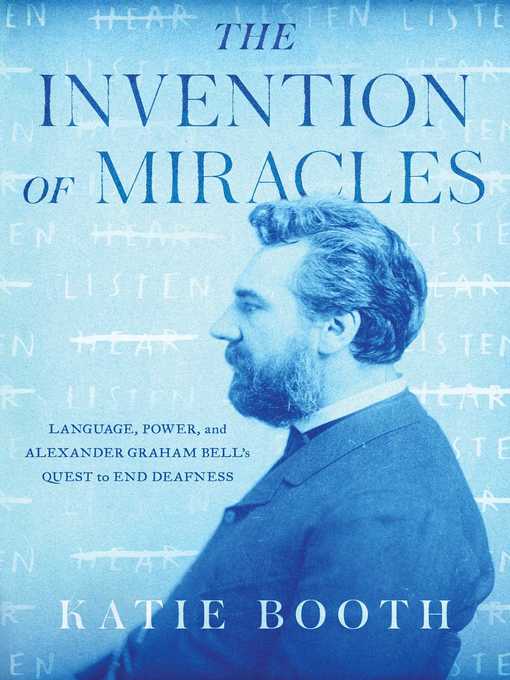
The Invention of Miracles
Language, Power, and Alexander Graham Bell's Quest to End Deafness
- اطلاعات
- نقد و بررسی
- دیدگاه کاربران
نقد و بررسی

February 15, 2021
A writing teacher shows why Alexander Graham Bell "went down in Deaf history as the culture's great enemy" and examines his enduring influence. Bell's invention of the telephone has eclipsed some of his quirkier traits, such as his habit of celebrating his triumphs by doing a Mohawk war dance that he learned from Indigenous people after his family moved from Scotland to Canada. More significantly, the telephone has overshadowed his early work as a teacher of the deaf and his steadfast view that they should learn to speak rather than sign. Booth, a hearing author who was raised in a mixed hearing/deaf family, expands the picture with a respectful yet critical biography that draws on scholarly research and her years of communicating with deaf relatives through signing. She casts Bell as a well-intentioned teacher who nonetheless did lasting harm by viewing deafness as a "defect" and by championing "oralism" (learning to speak) when research showed the greater benefits of "manualism" (signing) or "combinism" (using both methods), the approach favored by Edward Miner Gallaudet and others. Booth skillfully recaps signal events of Bell's youth in Edinburgh, his down-to-the-wire battle with Elisha Gray to patent the telephone, his marriage to his deaf student Mabel Hubbard and subsequent American citizenship, and his friendships with Helen Keller and others. She also links his work to the continuing "institutional oppression" of the deaf. In one of a number of potentially controversial stances, the author argues that cochlear implants "can be a helpful tool for deaf people, but they are not a cure" and that some implant education programs are a modern version of the oralism favored by Bell, which she believes insufficiently considered the views of the deaf. At a time when "less than 8 percent of deaf children grow up with regular sign language access," this ardent book is likely to reignite debates over what constitutes justice for the Deaf community. A well-written biography reveals less-familiar aspects of the life of the famed inventor.
COPYRIGHT(2021) Kirkus Reviews, ALL RIGHTS RESERVED.

March 15, 2021
Best known for inventing the telephone, Alexander Graham Bell dedicated much of his career not to his famous invention but to his lifelong passion for deaf education. Raised by a deaf mother (and later married to a deaf wife), Bell believed ardently in his own ability to bring deaf children out of isolation and into community. But as Booth, who is hearing, reveals in this careful and balanced history of Bell's work, the community he desired for the deaf had nothing to do with the vibrant Deaf culture that was beginning to blossom in Bell's time. Instead, he sought to teach deaf people to speak aloud, despite mounting evidence that this strategy damaged language acquisition, precluded education in other areas, cut students off from the community of the signing deaf, and failed even at its stated goal of integrating them into the hearing world. Booth explores the progression of Bell's career with compassion and nuance, eliding neither his good intentions nor the lasting harm that his emphasis on orality wrought on generations of D/deaf students.
COPYRIGHT(2021) Booklist, ALL RIGHTS RESERVED.

Starred review from April 16, 2021
In this thoughtful biography, Booth (English, Univ. of Pittsburgh) reexamines the historical legacy of Alexander Graham Bell (1847-1922), the inventor of the telephone. Booth acknowledges Bell's role in helping people communicate, but she does not shy away from his complicated legacy within the Deaf community. Booth writes that she was compelled to research Bell when her Deaf grandmother was denied interpretative services in the hospital, resulting in her death. Raised in a mixed hearing/Deaf family, Booth had always understood that American Sign Language was a language. She writes that Bell, however, had a lifelong obsession with oralism (teaching Deaf people how to speak) and looked down on ASL. When his methods proved unreliable, he veered into eugenics, Booth writes, and promoted legislation that would forbid Deaf people to marry one another. Bell's writings are believed to have inspired Nazi sterilization policies. The narrative of Booth's book occasionally drifts into the minutia of research and patent law, yet the contrast between Bell's inventions and his descent into eugenic thought is thoroughly gripping and unsettling. VERDICT A stunning biography that documents the Deaf people's lengthy and ongoing efforts to have ASL acknowledged as a valid language. Booth's writing stands apart and sheds insight on disability history in the 20th century.--Jessica Bushore, Xenia, OH
Copyright 2021 Library Journal, LLC Used with permission.




دیدگاه کاربران